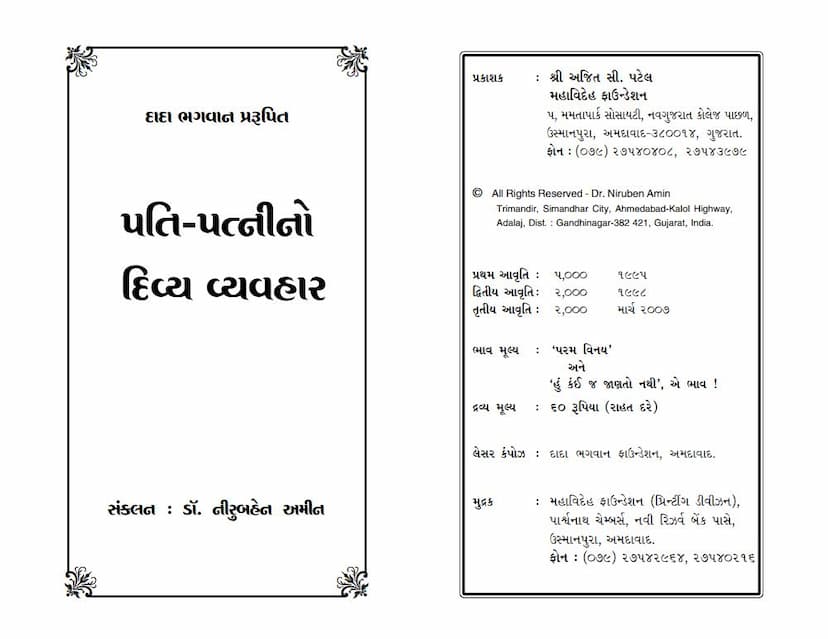Pati Patni No Divya Vyavahar Granth
Added to library: September 2, 2025

Summary
Here's a comprehensive summary of the Jain text "Pati Patni No Divya Vyavahar Granth" (The Divine Conduct of Husband and Wife) by Dada Bhagwan, based on the provided text:
Book Title: Pati Patni No Divya Vyavahar Granth (The Divine Conduct of Husband and Wife) Author: Dada Bhagwan (as expounded by Him) Publisher: Mahavideh Foundation Compiled by: Dr. Niruben Amin
Core Theme: The book, compiled from Dada Bhagwan's discourses, aims to guide couples towards a harmonious and divine married life by addressing common conflicts and misunderstandings that arise in their interactions. It emphasizes the importance of practical spiritual wisdom in navigating marital challenges and establishing a home filled with love.
Key Messages and Concepts:
- "One Family" Concept: The fundamental principle is to view the marital relationship as a unified family, transcending "mine" and "yours" (mari-tari). This fosters mutual adjustment and prevents clashes. True family life should be characterized by overflowing love.
- The Art of Living: The book stresses that marriage is not just a social contract but an opportunity to learn the "art of living." This art cannot be acquired through mere penance or austerity but through practical understanding and skillful conduct.
- Avoiding Conflicts (Klesh) and Clashes: The text extensively discusses various types of conflicts that plague married life, including:
- Disagreements (Matbhed): These are seen as inevitable due to differing personalities but should not escalate into clashes.
- Arguments (Klesh): These should be avoided at all costs. If they arise, they must be immediately quelled.
- Grievances (Kankal): Women are noted to hold onto grievances more than men.
- Accusations and Blame: The book warns against blaming each other and emphasizes self-reflection.
- The Role of "Jnani Purush" (The Enlightened One): Dada Bhagwan, through His divine knowledge and spiritual insights, offers solutions to marital discord. His teachings are presented as a direct link to self-realization, enabling individuals to live faultlessly and experience self-adoration. He Himself experienced a perfect marital relationship with His wife, Heeraba, and this experience forms the basis of His advice.
- Understanding and Adjustment: The core of harmonious living lies in understanding each other's nature and adjusting accordingly. The book uses metaphors like "adjust everywhere" and emphasizes the importance of "samaj" (understanding) and "samaj thi prapta Brahmacharya" (celibacy through understanding).
- The Fault is Not in the External Situation: The book repeatedly highlights that external events or actions (like a broken dish or spilled curry) are not the real cause of conflict. Instead, it's the internal lack of understanding, ego, and attachment that fuels disagreements.
- Practical Guidance: The book offers practical advice on various aspects of married life:
- Managing Moods: When a spouse is upset, the other should try to paculate them, offering comfort like a warm drink or a thoughtful gesture.
- Accepting Mistakes: Husbands are advised to take blame graciously, especially in the presence of children, to maintain harmony.
- Communication: The importance of gentle and understanding communication is stressed, avoiding harsh words that wound the heart.
- Self-Improvement: The emphasis is on "su'dharavu" (self-improvement) rather than trying to "su'dharva" (correct) the spouse.
- Respecting Boundaries (Departmental Separation): The concept of separate "departments" for husband and wife is introduced, where each respects the other's domain without interference. For instance, the husband should not interfere in kitchen matters, and the wife should not interfere in financial or business matters.
- Controlling Anger and Ego: Managing anger (krodh) and ego (maan) is crucial. The book advocates for understanding the other's perspective and finding common ground.
- Dealing with Doubts (Shanka): Doubts are described as a form of paralysis of the intellect. The text advises against indulging in suspicion, especially regarding character, as it breeds negative karma.
- True Love vs. Attachment: The book differentiates between true love (unconditional and unwavering) and attachment (which is conditional and fluctuates).
- The Role of "Vastuthanthit": The principle of "Vastuthanthit" (whatever has happened is justice/orderly) is presented as a way to accept situations without blame, understanding that events unfold as per a cosmic law.
- Respecting the Spouse: The core of a happy marriage is mutual respect, understanding, and adjusting. The spouse should be treated as a partner, not a subordinate or owner.
- The Importance of Self-Realization: Ultimately, true happiness and resolution of marital conflicts come from self-realization, understanding the true nature of the self as pure consciousness, beyond the transient nature of the body and relationships.
Overall Tone: The book is highly practical, offering down-to-earth advice grounded in spiritual wisdom. Dada Bhagwan's approach is direct, compassionate, and often uses relatable analogies and stern reminders to guide readers towards a better understanding of themselves and their partners. The underlying message is that a peaceful and loving home is the foundation for spiritual progress and worldly well-being.
Target Audience: Primarily married couples, but the principles of understanding, adjustment, and self-awareness are applicable to all human relationships.